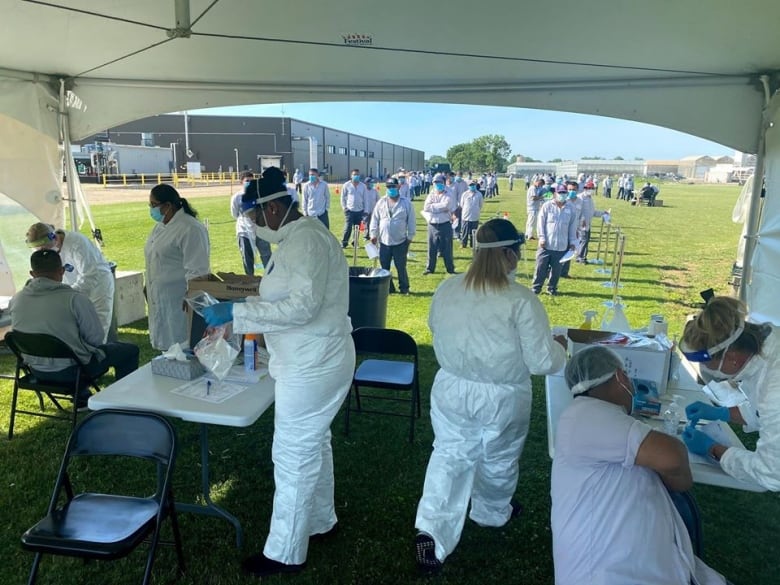Leamington hospital's incoming CEO says it's a good time for new leadership
Kristin Kennedy was announced as the new CEO of Erie Shores HealthCare on Friday

Erie Shores HealthCare's new CEO, Kristin Kennedy, says the hospital is well positioned to deal with the next phase of the COVID-19 pandemic.
Kennedy was announced Friday as the new CEO of Erie Shores HealthCare. She is the third CEO since the pandemic began.
In May, as the pandemic hit the region hard with cases in long term care homes and in the agri-food sector, Janice Dawson left the hospital as CEO after three years in the job. Dr. Ross Moncur, the hospital's chief of staff, was named interim CEO until Kennedy's hiring.
The role is a step up for Kennedy who had been serving as the hospital's vice president of patient services and chief nursing. According to a news release, she has worked in healthcare for 25 years, holds a designation as a certified health executive, a masters degree in health management and is pursuing a degree in health law (LLM) at Osgoode Hall Law School. She is also an assistant professor at McMaster University.
The hospital said it selected Kennedy after a six-month search by its board of directors.
Kennedy spoke with CBC's Windsor Morning host Tony Doucette Wednesday about what it's like to take on the top position in the middle of a pandemic.
What have you observed about the toll this pandemic has taken on nurses and other people working on the front line?
It has been very challenging for our front-line staff, our physicians and the leadership team as well. We know going into the second wave, there are a lot of anxieties for frontline staff, especially considering how they are going to balance work and family life, especially with daycare and school and the unknown of that. That's one of my key priorities right now, is stabilizing from within and being here to support those frontline staff and look at what strategies we can employ here.
The previous CEO, Janice Dawson, left the hospital in late May, and that happened as COVID-19 cases in the farm sector were just beginning to spike. Wasn't that an awkward time for a change in leadership?
No, Janice had left for professional and personal reasons, and Dr. [Ross] Moncur stepped up and did a fantastic job in leading us through the initial phase of the pandemic. We were at the forefront of that with the outbreak in the agri-food sector, as well as our support for the long term care facilities here in Leamington and Kingsville. This is a great time now for us to transition where we have this lull and before we prep for a second wave.

You mentioned a lull. We have seen fewer patients being hospitalized for COVID-19 over the past couple of months. What benefit has that afforded you as you look forward?
I think it's given us an opportunity here in the organization to really look at what lessons have been learned over the last six to eight months and how we can capitalize on some efficiencies and some improvements as we help internally with the staff, but also how we look forward for external partnerships and work with the long term care facilities, retirement homes, some of our congregate living settings here in Leamington and Kingsville, as well as in the agri-food sector.
Last Friday, we learned of 17 cases among workers at a farm in Kingsville. What kind of response is coming from your hospital with regard to that outbreak right now?
Over the last 96 hours, myself here at Erie Shore's HealthCare as well as Windsor-Essex E.M.S. and Home and Community Care have been working with public health, looking to re-mobilize our field health assessment team. That is one of our teams that go out to the farms and the greenhouse sector and we assess any symptomatic positive COVID cases ... to see if they need to be diverted to the emergency room for assessment and/or an admission to an acute care hospital, [either] ourselves or to Windsor Regional ... We're hoping to have that up and running by tomorrow morning and hoping with our long term care initiative as well, that we can preemptively minimize any spread.

There was a lot of confusion this year when it came to testing migrant workers and containing the virus. What assurances can you give the community that things will be handled better in the future?
I think we put great mechanisms in place with our emergency management teams here with the municipality, as well as long term care, the agri-food sector, [and] Ontario Health. We do meet routinely three times a week so that we can stay on top of things as well as tracking and trending any concerns we may see that come through our assessment centre and our emergency room as well. So we are on top of it. I'm confident in that. And we have put some great measures in place to preemptively minimize spread and be in communication with public health.
In light of everything that's that's happened since March, how much smarter are you today than you were seven months ago?
Well, I think we've learned a lot. I've grown as a leader and most certainly I've been on the front lines working with the nurses and the physicians through the assessment centre ... and quite excited for the next step in my career.
This interview has been edited for length and clarity.